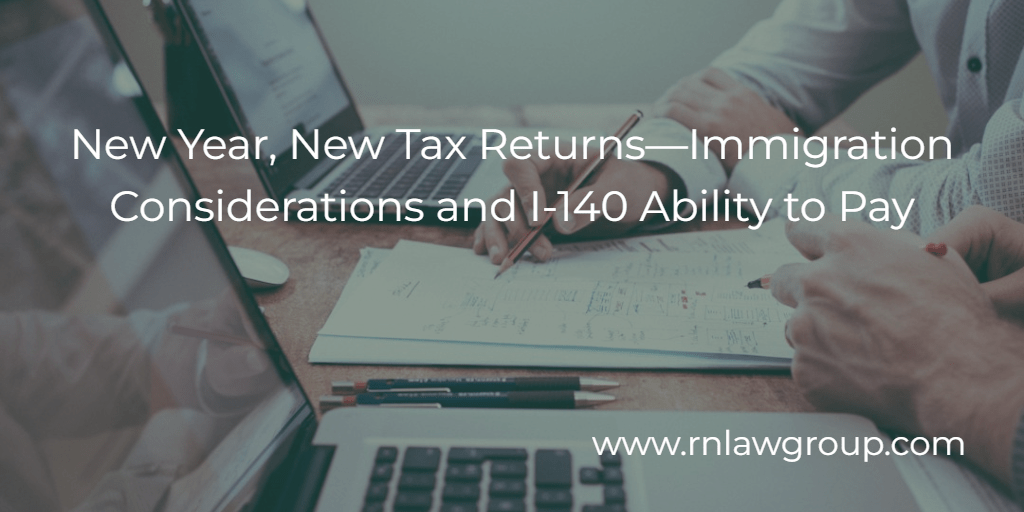
New Year, New Tax Returns—Immigration Considerations and I-140 Ability to Pay
As we refresh ourselves in the holiday season to hit the ground running in the new year, in preparation of this year’s tax returns it is important for companies sponsoring immigrant workers to recognize and understand the relevancy of those documents to immigration sponsorship petitions, the relevancy of the financial numbers contained therein, and how certain tax strategies may be beneficial for the business or shareholders but are “harmful” with regard to immigration sponsorship.
Often times, a company’s tax returns and/or financial documentation are the sole factor enabling or preventing a company’s acquisition of highly skilled foreign talent.
Why are company tax returns important for immigration filings?
In the context of employment-based immigrant visa petitions, a crucial requirement is the submission of a Labor Certification (PERM ETA 9089), which outlines the proposed or “proffered” salary—the wage offered to the Alien for the green card job opportunity. To secure approval for these petitions, the sponsoring employer must demonstrate its ability to consistently pay the Alien’s proffered wage throughout the entire immigration process until the sponsored foreign worker attains Lawful Permanent Resident status, commonly known as Green Card status.
As part of the evidence to showcase this ability to pay, United States Citizenship and Immigration Services (USCIS) mandates the submission of the company’s federal tax returns, audited financial statements, or annual reports, accompanied by payroll records illustrating that, during the relevant period, the sponsoring employer has consistently paid the employee at least the proffered wage.
The specific tax form required by USCIS depends on the business formation type of the filing company, such as sole proprietorship, partnership, S-Corporation, LLC, etc. For sole proprietors, USCIS examines the company owner’s personal Form 1040, US Individual Income Tax Return, focusing on Schedule C, Profit or Loss from Business. In the case of partnerships, USCIS refers to Form 1065, US Return of Partnership Income. For corporations or S-corporations, USCIS considers Form 1120 or 1120-S, respectively.
What financial numbers does USCIS look at?
When reviewing a tax return, USCIS focuses on two distinct figures: net income and net assets. In order to prove financial capability, a company typically needs to demonstrate that it possesses net income or net assets exceeding the offered wage to the foreign worker. It is crucial to note that USCIS specifically identifies or calculates these figures from designated sections on the mentioned tax forms.
For sole proprietorships, the company’s net income, if any, is reported on Form 1040, US Individual Income Tax Return, specifically on Schedule C, Profit or Loss from Business. In a sole proprietorship, where the company is the same legal entity as the owner, the individual’s assets are considered the company’s assets.
As for partnerships, corporations, and S-corporations, the company’s net income is found on the initial page of the tax return. For partnerships filing Form 1065, net income can be located on Schedule A Line 22 under “Ordinary Business Income (loss).” For corporations filing Form 1120, check Schedule A Line 30 for “Taxable Income.” For corporations filing Form 1120-S, refer to Schedule A Line 21 under “Ordinary Business Income (loss).”
In the case of net assets, USCIS employs a specific formula. The process involves consulting Schedule L and aggregating end-of-year figures for cash, trade notes and accounts receivable (less allowances for bad debts), inventories, US government obligations, tax-exempt securities, and other relevant current assets (found on all Forms Schedule A, lines 1-6). This total is then reduced by the aggregate amount of accounts payable, mortgages, notes, and bonds payable in over one year, along with other relevant current liabilities (Form 1065 Lines 15-17; Form 1120 and 1120-S Lines 16-18).
How much income or assets should the company show?
Typically, there is no one number that USCIS requires or wants to see before they approve immigration petitions. What is most important is that a company demonstrates its ability to pay the offered wages and this is typically based on the company’s net income or net assets. If the offered wage is lower than the company’s income or assets, USCIS will likely question the company’s ability to pay and subsequently deny the petition.
Therefore, as a general rule, it is always a best practice to demonstrate a net income and/or net assets exceeding the wages offered to your prospective foreign-worker employees. That said, it may be in the company’s overall best interest to forego certain tax avoidance strategies that lower the face value net income on a tax return so that this ability to pay requirement with USCIS is met.
Are the company’s tax returns too old? Can we submit Tax Extensions to USCIS?
Typically, USCIS will require the previous year’s tax return when analyzing a company’s ability to pay. Therefore, in 2023 USCIS looks to the company’s 2022 Tax Returns.
Currently as of January 2024, USCIS will continue to accept the company’s 2022 Tax Returns to show ability to pay in years 2023 and/or 2024. However, after the April 18, 2024 tax filing deadline, USCIS will want to see either the company’s 2023 Tax Returns, or otherwise a timely filed Form 7004 Tax Filing Extension.
When submitting a tax extension along with the previous year’s tax return, USCIS will likely accept those documents as sufficient for ability to pay purposes until October of the given year. After that date, USCIS will expect the 2023 tax documents.
Do we have to submit the company’s tax returns?
Not necessarily. While it is most typical that a company will submit its tax returns, USCIS will also accept independently audited financial statements, or for certain publicly traded companies their annual reports.
For more information, or for a detailed conversation regarding tax filings and potential immigration issues, please schedule a time to speak here.
By: Ryan A. Wilck, Partner and Attorney at Law
Ryan Wilck is a Managing Partner and attorney at Reddy Neumann Brown PC with over a decade of US immigration law experience, enthusiastic and proactive in his approach assisting clients and their employees through the various phases of the permanent residency a/k/a Green Card process. “Concilio et labore” is not only the motto of Ryan’s favorite sports club but is also his life’s motto; all things come through wisdom and effort. Ryan is passionate about gaining the trust of his clients by utilizing a relentless and detail-oriented approach to understand their specific goals and concerns, hoping to instill a sense of confidence and stability. Whatever your immigration problem or interest, he and his team will find a solution, through wisdom and effort. Reddy Neumann Brown PC has been serving the business community for over 20 years and is Houston’s largest immigration law firm focused solely on employment-based business immigration. We work with employers and their employees, helping navigate the complex immigration process efficiently and cost-effective.
We are committed to assisting our clients with navigating the complex PERM Labor Certification (ETA 9089 and other challenging immigration matters as an accomplished immigration law firm in Houston, Texas. Our team is here to offer the direction and support you require, whether you’re a company trying to hire top talent or a foreign worker seeking to develop a career in the United States. To find out more about how we can help you with your immigration issues, get in touch with us right away.

